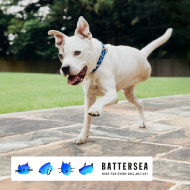“Think rescue first,” new pet owners urged

"Our preoccupation with breed is fuelling a ruthless pet trade based on looks alone – one that can sadly put profit before animal welfare,” Claire Horton.
A leading animal charity has launched a campaign urging potential pet owners to “think rescue first” when it comes to getting a new pet.
Battersea Dogs and Cats Home’s ‘Rescue is our Favourite Breed’ campaign celebrates the unique personality of rescue animals and calls on the public to look beyond a pet’s pedigree status. It comes as the charity warns that rescue cats and dogs are being increasingly overlooked in favour of more fashionable breeds.
Battersea’s research shows that 92 per cent of people say rescue is the right thing to do. Yet when it comes to getting a pet, many choose to search online for a specific breed. In the past year, Battersea says there have been 165,000 online searches a month for French bulldogs.
Of those who said they would not consider rescue, one fifth stated they could not get the breed they wanted from a rescue centre, and more than half (52%) remarked that animals in rescue centres often have health or behavioural problems.
Battersea’s chief executive, Claire Horton, said: “Even though one in four dogs and cats are rescues, you’re still more likely to hear about French bulldogs or Labradors being the nation’s favourite pets. Our preoccupation with breed is fuelling a ruthless pet trade based on looks alone – one that can sadly put profit before animal welfare.”
“Battersea is setting out to increase the visibility of rescue animals, to show they’re more common than you think and are in homes across the nation. They’re the most rewarding, responsible choice for a pet, and we’re hoping to bring them front of mind – to get all generations of animal lovers to think rescue first.”
To help encourage pet owners to look beyond the breed when searching for a pet, Battersea has removed breed filters from its online animal galleries. Initial tests revealed that when visitors to the site were not given the option to filter the breed, they viewed more animals’ profiles and more people went on to apply to re-home a cat or dog.
Battersea’s head of operations, Rob Young, said: “We know that misconceptions and pre-conceived notions about the traits and behaviours of certain dog and cat breeds can heavily influence people’s rehoming choices. By removing the option to search by breed we’re hoping that visitors to our website will be more open-minded to finding the right match.
“If someone is looking for an affectionate lap dog, or an energetic, playful pet, then they will find a perfect match regardless of breed. When you go to Battersea, you won’t just get a ragdoll, or a Labrador, or even a mongrel. Most importantly, you’ll be getting a rescue.”



 The Animal and Plant Health Agency (APHA) has updated its online reporting service for dead wild birds.
The Animal and Plant Health Agency (APHA) has updated its online reporting service for dead wild birds.